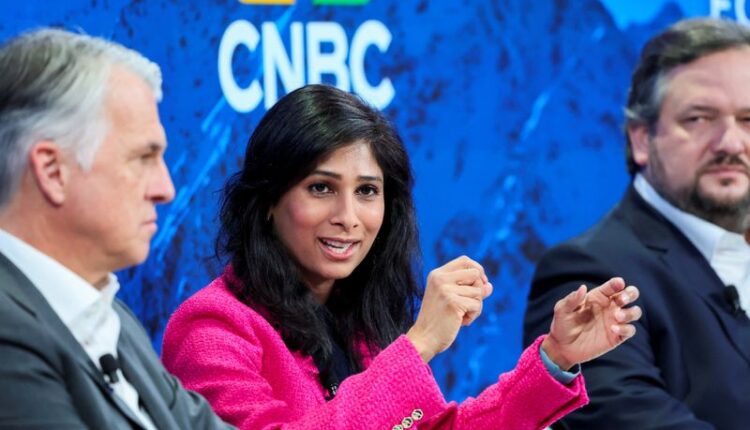IMF’s Gopinath urges BOJ to go slow in raising interest rates
By Leika Kihara
TOKYO (Reuters) -The Bank of Japan can avoid upending global markets with its policy shift by moving gradually when raising interest rates and providing clear communication along the way, International Monetary Fund First Deputy Managing Director Gita Gopinath said on Friday.
Japan’s output gap will stay closed into next year and this year’s annual wage negotiations will produce wage growth higher than last year, allowing the central bank to end its yield curve control (YCC) and massive asset-buying programme, she said.
Ending its negative interest rate policy in place since 2016, a move markets expect could happen by April, will also likely be smooth as there is a clear recognition by investors that inflation-adjusted real borrowing costs will remain very low, Gopinath said.
But further hikes in the short-term policy rate ought to be gradual and delivered in the course of several years, she said.
“Regardless of whether you do the first increase in two months or three months, the main point is to raise (rates) slowly, over a few years,” she told Reuters in an interview.
“As long as the BOJ moves gradually, which is what they have signaled that they will do, and provides the right communication to go along with it, that should not have very large spillovers to the rest of the world,” she said.
As part of efforts to reflate growth and sustainably achieve its 2% inflation target, the BOJ guides short-term interest rates at -0.1%, caps long-term bond yields around zero under YCC, and buys huge amounts of assets to pump money into the economy.
But with inflation having exceeded 2% for well over a year, the BOJ has been laying the groundwork for exiting its complex stimulus programme, with a Reuters poll tipping April as the likely timeframe for ending negative rates.
Gopinath said it was also important to keep Japan’s financial system stable when exiting easy policies, including by ensuring that minimum liquidity requirements are available not just for big banks but their smaller counterparts.
She said there was uncertainty around the level at which Japan’s interest rate would be deemed neutral, though some estimates by the IMF suggested the nominal rate would be between 1-2% if it were at a neutral level.
Given uncertainty over the economic outlook, the number and pace of short-term rate hikes should be data-dependent, she said.
“The point of moving gradually, is to get the confidence about incoming data, and making sure that you don’t move prematurely” and trigger downside risks, she said.

